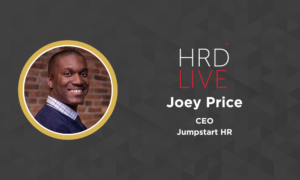Women in leadership: Louise Gulliver, MD, Professional Development, Institute of Directors
- 10 Min Read
Louise Gulliver, MD, Professional Development at the Institute of Directors takes the time to speak with HRD Connect about her take on women in leadership. Starting by giving us an overview of her own career path then discusses the gender pay gap and gives some detailed advice to women who are developing their careers and how best to achieve their tailored goals.
- Author: Emily Sexton-Brown
- Date published: May 8, 2018
- Categories

Louise Gulliver, MD, Professional Development at the Institute of Directors takes the time to speak with HRD Connect about her take on women in leadership. Starting by giving us an overview of her own career path then discusses the gender pay gap and gives some detailed advice to women who are developing their careers and how best to achieve their tailored goals.
 Louise is responsible for the IoD’s board-level training programmes with courses ranging from leadership and fiduciary duties, to strategy and HR. She oversees its renowned Chartered Director qualification, and The IoD Academy which was opened last year under her leadership; a dedicated director-training facility in Central London to help improve board performance.
Louise is responsible for the IoD’s board-level training programmes with courses ranging from leadership and fiduciary duties, to strategy and HR. She oversees its renowned Chartered Director qualification, and The IoD Academy which was opened last year under her leadership; a dedicated director-training facility in Central London to help improve board performance.
Can you tell me a little about your career and how you reached your position?
My ‘second’ career started in 1995, aged 21, when I left university having gained a 2:1 in international relations and business studies from Staffordshire University.
I say second career because I had worked from a young age. My mother was divorced and a single, working parent with two children to raise. Despite possessing some great skills and having learnt several second languages, mum was in low paid employment so money was in short supply. I took a part time job at the age of 14 and became pretty much financially self-sufficient at a very young age. I didn’t really have a career plan. What I did want was financial independence which I saw as freedom.
“For women to succeed in leadership requires a combination of factors – some are directly in our own control and others require employers to create an environment conducive to women progressing to, and succeeding in, senior roles.”
I spent most of my university holidays working night shift, sorting mail. My first job was with Hays plc (the company I worked for in my holidays) and I joined their marketing team as a junior telemarketer. It was a daunting task, calling total strangers and asking them if they wanted to buy more! It turned out to be an excellent grounding. I quickly found my feet and started to study in the evenings to become a professional marketer. I soon qualified and gained the Chartered Institute of Marketing’s postgraduate Diploma in Marketing. I then went on to become a Chartered Marketer and have retained the status ever since – I still draw from the knowledge I acquired from this wonderful learning experience, especially when developing strategy.
I then went on to assume my first directorship – as marketing director for a professional training company called TACK International. This is where I developed further my enjoyment of marketing, passion for international travel (it was a global business) but really developed my love of all things learning and development. I left the company having become the first female managing director in its 65-year history which makes me very proud and is, I hope, encouragement to aspiring chief execs that have not come from a traditional route such as finance.
I joined the Institute of Directors (IoD) to develop the organisation’s professional development business and have had an amazing time doing so. Some of my peers were surprised in my decision to join the IoD, mainly down to its traditional, dare I say, pale, male and stale image to some. But that was precisely why I joined. I wanted to be part of the new IoD generation. Not only does the IoD have a fantastic brand provenance but its Royal Charter contains a clear mandate to promote high levels of skill, knowledge, professional competence and integrity on the part of directors and senior leaders – our Chartered Director qualification is designed to do just that and is an excellent way for all professionals to ensure they are Board ready.
I am currently Managing Director at the IoD, responsible for Professional Development and more recently Membership too. I relish the opportunity to focus on the diversity of our membership. Today women represent just 18% of the IoD’s membership (although this has increased by 2 percentage points in the last 12 months) and we want to be at 30% by 2022. It is not just women though – we need to ensure that the IoD is representative of the kaleidoscope that is British Business.
In my own experience, my career progression has been down to a combination of factors – my own capability, knowledge, skills and behaviour, but also the choices I have taken. Those choices are apparent not only in my professional life but my personal life.
Professionally I have a wide network. Importantly it is a diverse network. I have taken every opportunity to learn from those more experienced than me (men and women) and I (perhaps unconsciously) acquired a career sponsor (a man) from an early age. This individual was there during a number of seminal moments in my career, vitally my first board appointment (despite pushback from other male board members that I was too young and inexperienced etc.). He also facilitated the introduction which enabled me to secure my current role. Luck or judgement? Probably a bit of both. He saw something in me that I didn’t, at least not at the time.
In my experience, your choice of partner (always but for this topic, specifically as a woman) has a direct impact on your professional career development. All too many women who have ‘big’ day jobs have equally ‘big’ jobs at home. ‘Having it all’ doesn’t happen (at least not without a supportive partner or family) to people like me and therefore to most women.
Whilst I hugely admire people like Arianna Huffington and Sheryl Sandberg as inspirational leaders, I don’t have the same resources to draw on to enable me to achieve the same level of self-actualisation – though perhaps it is a chicken and egg situation.
What I do have is a husband who is my equal. We both have ‘big’ jobs and we both take equal responsibility at home, specifically for raising our children.
What do you think are the biggest challenges for women in leadership?
On conceding victory to her Republican rival Donald Trump in the 2016 US Presidential Election, Hillary Clinton said: “Although we weren’t able to shatter that highest, hardest glass ceiling this time, thanks to you, it’s got about 18 million cracks in it.”
Hillary’s comments are all the more poignant in 2018 as we mark 100 years since some British women won the right to vote. Much has happened to forward the cause of the women’s movement in those 100 years but so much more needs to change for gender equality to become a reality not only in a professional context but in society at large.
In the world of work, at an overall level, the gender pay gap between men and women reduced from 27.5% in 1997 to 18.4% in 2017. As I said, change, frustratingly, takes time.
One of the simple reasons for this is that men tend to hold the majority of the most senior roles within a company which are, of course, the highest paid and so the gap continues.
According to the Office of National Statistics in their January 2018 report ‘Understanding the gender pay gap in the UK’, at the younger ages, men’s and women’s pay grow at similar rates, at the age of 24 men’s pay has grown by 2.9 percentage points more (since the level at age 16), but this divergence in growth continues and by the age of 48 men’s pay has grown 16.3 percentage points (since the level at age 16) more than women’s.
In March 2018, the Independent ran a headline saying that more people called David and Steve lead FTSE 100 companies than women and people from ethnic minorities. There are just five Chief Executives of FTSE 100 companies from ethnic minorities and only seven women.
One of the reasons attributed to the sharp widening of the pay gap between men and women after the age of 30, and to women not advancing as rapidly or as far in their careers as men, is down to women having children. The fact is that women still shoulder the overwhelming majority of childcare responsibilities. The government has changed the law to allow fathers to divide up parental leave, but a survey by the Chartered Institute of Personnel and Development found that two-thirds of organisations have had no employees take up the offer of shared leave. I can’t believe there aren’t more fathers who want to be more involved, and I’d encourage companies to make it clear to employees that the option is open to them. I also think that businesses can do more to make senior positions open to mothers as job-shares. Just because a job has always been done by one person full-time doesn’t mean that’s the only way to do it.
More than anything though, we need a culture change. Women are not less committed or capable just because they have children. If we are to ensure a steady pipeline of women breaking through that glass ceiling they have to have the same opportunities to reach senior positions as men.
For women to succeed in leadership requires a combination of factors – some are directly in our own control and others require employers to create an environment conducive to women progressing to, and succeeding in, senior roles.
Some of the things we can do individually include:
- Seeking out a career champion/mentor to support and advise on your progression
- Developing a wide and diverse network
- Investing in your continuing professional development
- Avoiding as far as possible the ‘second shift’ or at least don’t do it alone (‘second shift’ is a metaphor used to describe women who, having done a full day in paid employment, return home to a second shift in terms of looking after home and family). It is hardly surprising therefore that women who work two shifts are more prone to mental health issues and other related problems
- Choosing a partner who respects your equal status. If you are a working mum and a single parent (I speak from childhood experience of having a single working woman as my mother), suffice it to say you need to work even harder to build your support network
- Asking for progression at work; there is much to be said for the old adage ‘if you don’t ask, you don’t get’
- Knowing your worth, financially. This can often be especially hard for women so benchmark yourself, build the evidence and ask for the remuneration you deserve.
Organisations have a major part to play in breaking the glass ceiling and supporting women into senior roles. It is not true (as is sometimes claimed), that there are not enough board-ready women around for companies to choose from, but board appointments are naturally very competitive and training and qualifications can help candidates to get an edge. This process should work two ways of course, and companies and head-hunters should consider ways to make the hiring process more balanced, for example by having name-blind applications in the early stages.
Companies must work hard to advance all employees and specifically to address issues of unconscious bias. Senior leaders must demonstrate the culture they wish to see. Training and development plays a crucial role and line managers need to be equipped with a leadership toolkit, which includes the ability to overcome discrimination of any kind. A little creativity and alternative thinking can provide no end of opportunity for women to progress their careers.
If you could give women progressing into more senior roles a key piece advice, what would it be?
It is hard to advise one thing when the reality is that you need a combination of factors to succeed. If pushed though, I would say find yourself a mentor who can help you to prepare for progression into a more senior role and, when you get close, remember to ask, not only for the opportunity but for the right level of reward. You’re worth it.









